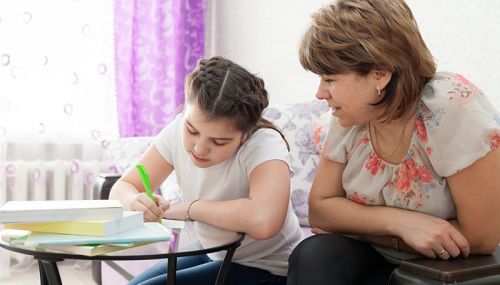- Our studies
- Our research
- Publications and resources
- Data access and training
- About
- News
- Events
- Get in touch
- Join our mailing list

Eleven-year-olds who have someone at home making sure they finish their homework before taking part in other activities, such as watching TV, score higher on cognitive assessments than those who do not.
However, children who frequently ask their parents for help with school work score lower than their peers who don’t ask for help. Researchers from the Social Market Foundation (SMF) think-tank explained that asking for assistance could be a sign that children are already struggling academically.
The SMF analysed information on more than 16,000 children born across the UK in 2000-01 and who are taking part in the Millennium Cohort Study. The report was for a cross-party commission on educational equality chaired by Nick Clegg, the former Liberal Democrat leader.
The researchers looked at whether parents had been engaged with their children’s school work at the ages of 5 and 11, and compared this to the children’s scores on verbal skills assessments at age 11.
Children who had someone at home to supervise time spent on homework scored, on average, almost 2 points higher than those who did not.
Eleven-year-olds whose mums and dads attended parents’ evening scored, on average, 1.26 points higher. Those who said that their parents took an interest in their school work scored, on average, 2.32 points higher in the age 11 test.
Extra-curricular activities, such as listening and playing music, and after-school clubs were also associated with higher achievement.
Although the researchers found a positive effect of parents’ engagement in their sons’ and daughters’ schooling, they explained that parents’ income and qualifications have a bigger bearing on children’s performance.
Children with high-earning and academically successful parents gained ten points more, on average, in the age 11 assessment than those from poorer and less educated families.
The report said: “Parental demographic characteristics such as income and education level matter a lot, and efforts to reduce inequality in attainment by focusing on parental engagement should not come at the expense of efforts to tackle other inequalities.
“Nevertheless, we demonstrate aspects of parental engagement that are associated with attainment, and well-designed policies in these areas could have the potential to improve children’s educational prospects. If several areas of parental engagement were addressed at once then results could be powerful.”
Family matters – the role of parents in children’s educational attainment by the Social Market Foundation was published in November 2016
Ryan Bradshaw
Senior Communications Officer
Phone: 020 7612 6516
Email: r.bradshaw@ucl.ac.uk